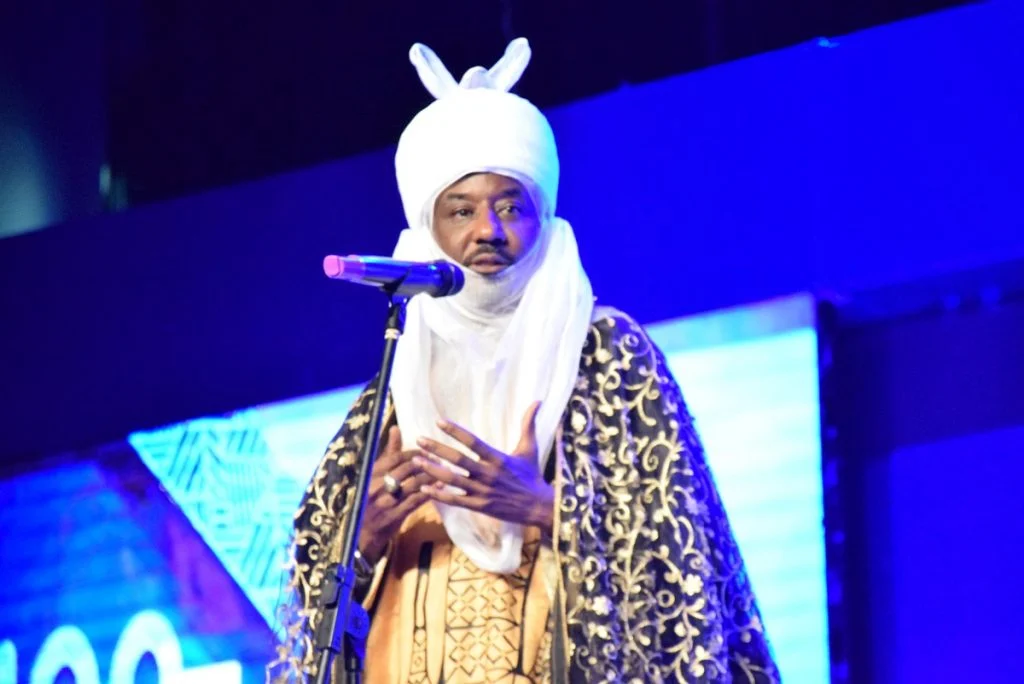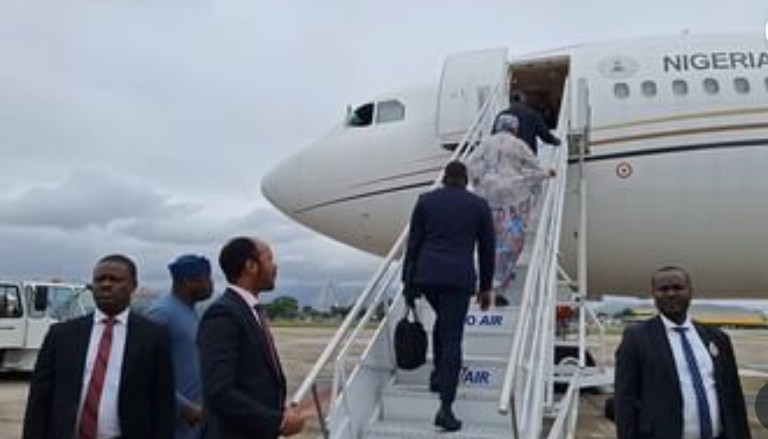News
A Gov Practicing Sharia Stole Public Funds, Bought Hotel In Lagos – Sanusi

Muhammadu Sanusi II, the 14th Emir of Kano, says greed, selfishness and envy are “much greater sins” than unlawful sex, homosexuality and gambling.
Naijablitznews reports Sanusi spoke on Sunday as a guest lecturer during a virtual Ramadan lecture titled “Some dimensions of the concept of ibadah”.
The former governor of the Central Bank of Nigeria (CBN) said part of the reason there is a social disorder in the country is that some Muslims forget that they will give an account of their actions before God.
He said people observe prayers and fast but keep committing evil “because our hearts are not Islamic”.
Sanusi alleged that a governor of a Sharia-implementing state in Nigeria stole funds and bought a hotel in Lagos.
While he did not mention the name of the governor, Sanusi said his state remained a “most serious example of backwardness”.
“How do you get a Muslim to become a minister or governor and all he is thinking of is how he is going to steal public funds to build a big house for himself or have billions for his children and deny people?
“We even have had state governors who said they were practising sharia, they were leading the implementation of sharia and they were stealing money and buying hotels.
“There was a governor implementing sharia in a sharia state who stole public funds and bought a hotel in Lagos. And he says Allahu Akbar.
“Meanwhile, his state was left with no education, with no health care, with one of the most serious cases of security, most serious examples of backwardness.
“Greed, selfishness, wickedness, envy. These are much greater sins than zina (illegal sexual intercourse), homosexuality, and gambling. The sins of the heart are greater than the sins of the body. We are focused so much on the external things.
“The purity of our hearts, the love for humanity, the fear of Allah, the knowledge that we are accountable to Allah, all of that is missing.
Sanusi also said the misinterpretation of some teachings of Islam “has been the cause of some of the problems that we are facing today”.
He encouraged Muslims to serve as examples for those in the coming centuries to look up to.
News
HoR to Lead March, Launch Initiatives Against Gender-Based Violence

By Gloria Ikibah
As part of the annual 16 Days of Activism Against Gender-Based Violence, the House of Representatives is set to lead a historic march on Monday, November 25, 2024, in a bold effort to tackle gender-based violence (GBV) in the country.
The march, which begins at 8:00 AM, will see over 1,000 participants, including lawmakers and members of the public walk from the National Assembly to the Nigeria Police Force Headquarters in Abuja. The event will culminate in the submission of a petition to the Inspector General of Police, demanding decisive action against GBV and greater protection for vulnerable groups.
Speaking about the initiative, the Speaker of the House of Representatives, Rt. Hon. Abbas Tajudeen, PhD., GCON, said, “This march and the activities that follow are not mere gestures but a reflection of our determination to confront gender-based violence head-on. We are committed to building a society where justice, equality, and safety prevail for all Nigerians.”
In a statement by the House Spokesperson, Rep. Akin Rotimi on Saturday in Abuja, he said, “The 10th House of Representatives has reaffirmed its commitment to systemic reforms, collaboration, and accountability in the fight against gender-based violence.
“In addition to the march, the House has outlined key activities in alignment with its Legislative Agenda (2023–2027) to sustain awareness and action throughout the campaign period.
“Sash Demonstration Ceremony – Tuesday, November 26, 2024
“Convergence of State Assembly Speakers – Monday, December 9, 2024. A strategic meeting at the Transcorp Hilton, Abuja, will bring together Speakers of State Houses of Assembly to discuss legislative measures for combating GBV nationwide.
“National Citizens’ Summit and GBV Conference 2024 – Tuesday, December 10, 2024. The summit will focus on constitutional reforms and securing endorsements for gender equality initiatives led by the House of Representatives”.
Naijablitznews.com reports that this year’s 16 Days of Activism aims to galvanise nationwide efforts and inspire collective action to protect human rights, ensure justice, and create a safer, more equitable Nigeria.
News
NUJ-FCT Elections: Comrade Ike To Flag-Off Campaign With Free Medical Checks, Treatment


News
President Tinubu Leaves Brazil After G20 Summit

President Bola Tinubu has departed Galeao Air force Basa (SBGL) Airport, Rio de Janeiro, Brazil, on Saturday, for Abuja after attending the 19th G20 Leaders Summit in Rio de Janeiro, Brazil.
The President is due to arrive at the Presidential Wing of Nnamdi Azikiwe International Airport, Abuja, at 10.00 p.m. (Nigerian time).
President Tinubu had attended the G20 Leaders summit where he endorsed the global alliance against hunger and poverty, which he said was pivotal.
The President also held bilateral talks with Kristalina Georgieva, the Managing Director of the International Monetary Fund (IMF), who commended his administration’s economic reforms and their positive indicators.
He also presided over the signing of a 2.5 billion dollar Letter of Intent between the Nigerian government and the JBS S.A., a Brazilian company and one of the top three largest meat processing companies in the World.
The president was accompanied in the trip by senior government officials including the minister of foreign affairs yusuf Tuggar, the national security adviser, Nuhu RIBADU and many others.
-

 Metro12 hours ago
Metro12 hours agoBusinessDay Journalist Finally Regains Freedom From ‘One-Chance’ Kidnappers In Abuja
-

 Metro17 hours ago
Metro17 hours agoCourt remands 113 foreigners over alleged cybercrime
-

 Metro12 hours ago
Metro12 hours agoPolice recover stolen SUV after gun duel with robbers in Abuja
-

 News18 hours ago
News18 hours agoFull List: Innoson, Mitsubishi, Dantama , Others – CAC Delists 80,000 Companies
-

 News18 hours ago
News18 hours agoJapa: We’ve discovered over 10,000 fraudulent foreign student acceptance letters – Canadian Authorities
-

 Metro18 hours ago
Metro18 hours agoGunmen kidnap journalist’s relatives, demand N50m ransom
-

 News18 hours ago
News18 hours agoFG reinstates Ikechebelu and Modebelu as UNIZIK Acting VC and Registrar
-

 News12 hours ago
News12 hours agoFG insists Rivers State funds is intact was never stopped








